Abstract
1. The modulation of L-type voltage-sensitive calcium channels in guinea-pig isolated ventricular myocytes by propafenone was examined by the whole cell voltage-clamp technique. 2. Propafenone, 10(-7) -5 x 10(-5) M, produced a concentration-dependent inhibition of Ca current (ICa) without any significant change in the current-voltage relation. Half-blocking concentration (IC50) of propafenone for the peak ICa at +10 mV was 5 x 10(-6) M. 3. The voltage-dependence of ICa inactivation was shifted in the hyperpolarizing direction in the presence of 5 x 10(-6) M propafenone. 4. A frequency-dependent relative block by propafenone was observed after repetitive depolarizing test pulses at a frequency of 0.5 and 1 Hz. The recovery of ICa from inactivation was prolonged by propafenone and the reactivation exhibited an additional exponential component attributed to the slow release from drug block of Ca channels. 5. These results suggest that propafenone, at therapeutic concentrations exhibits Ca channel blocking properties that may be involved in its antiarrhythmic mechanism.
Full text
PDF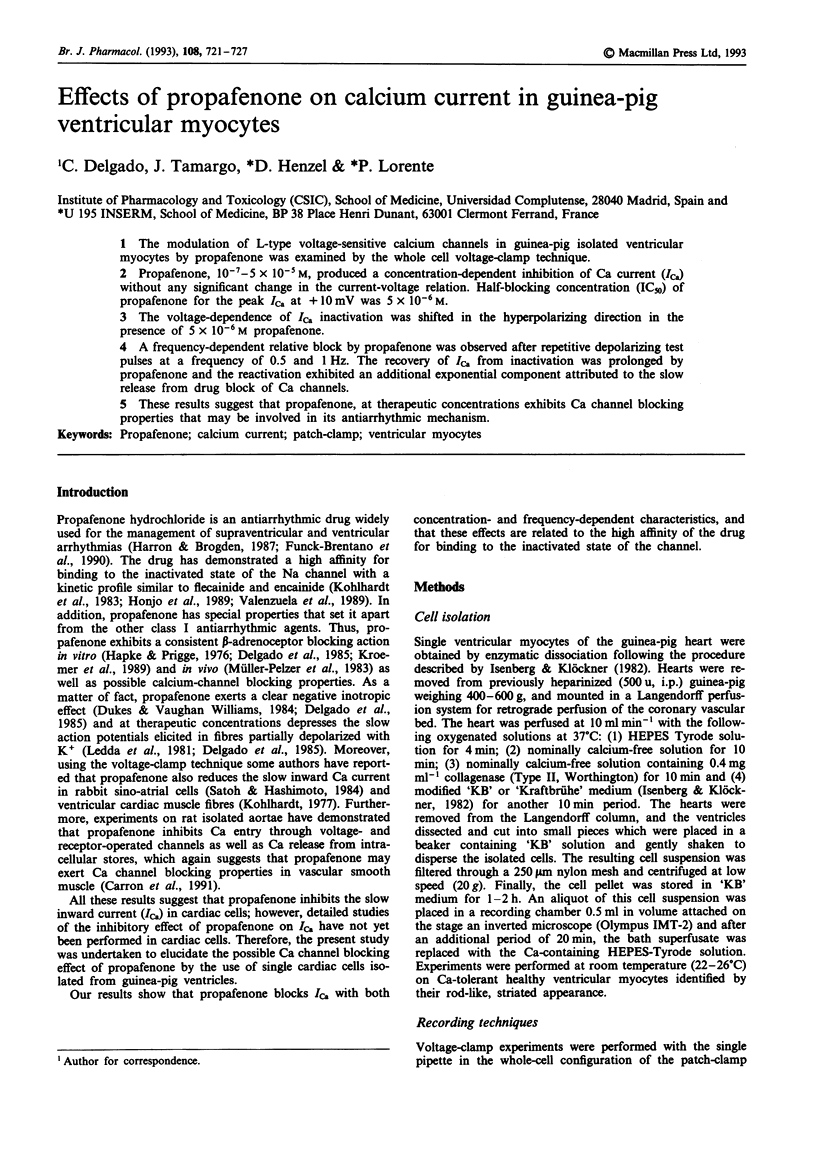
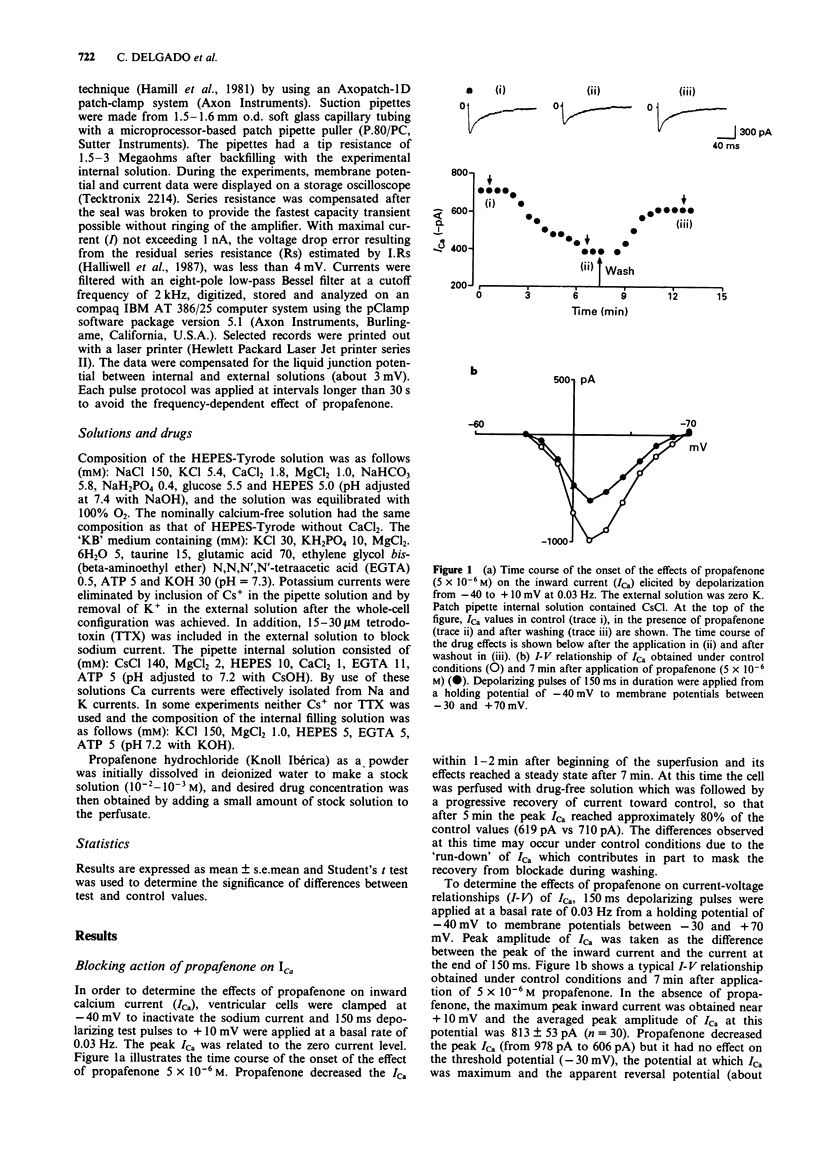
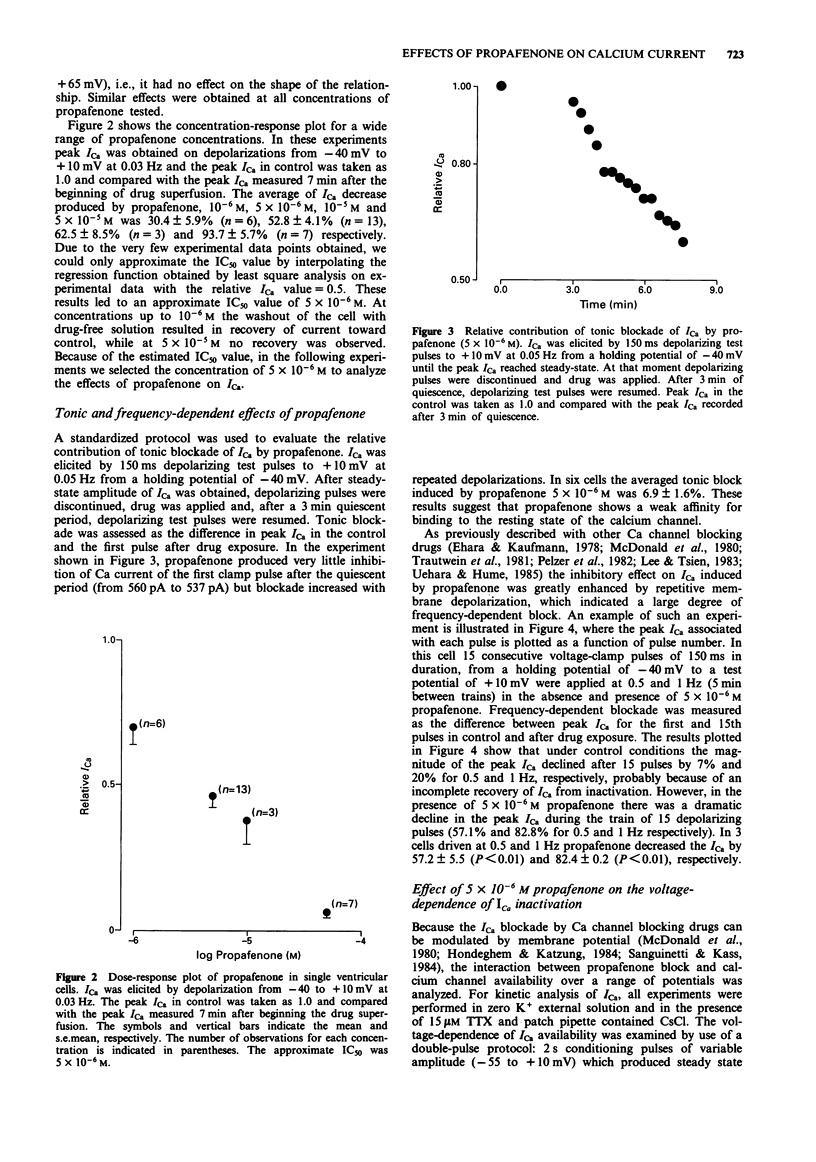
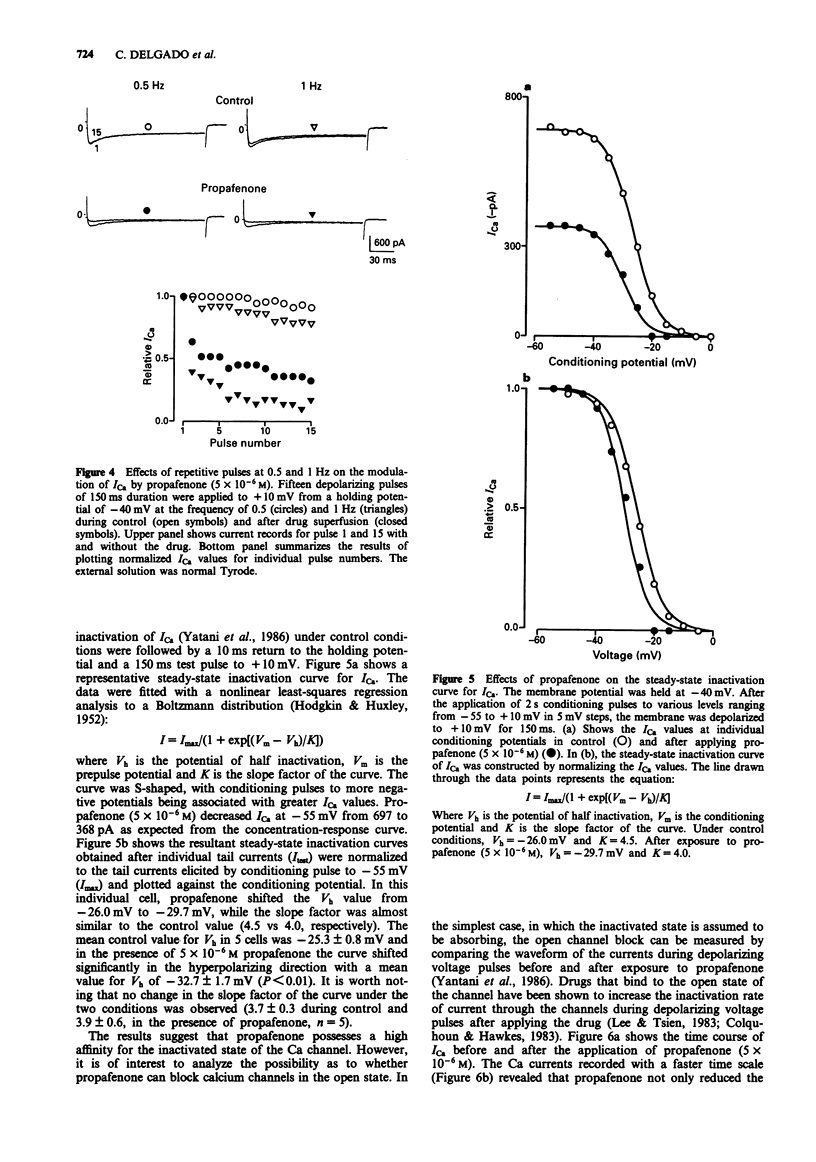
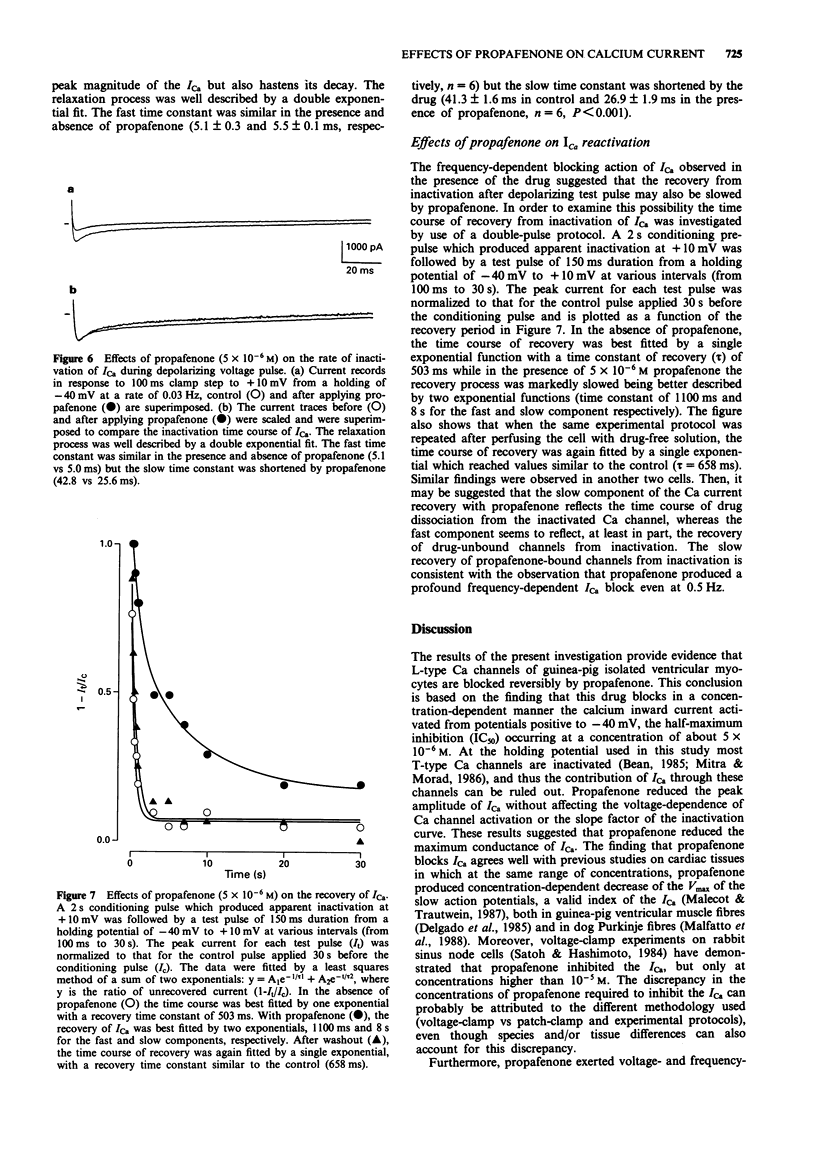
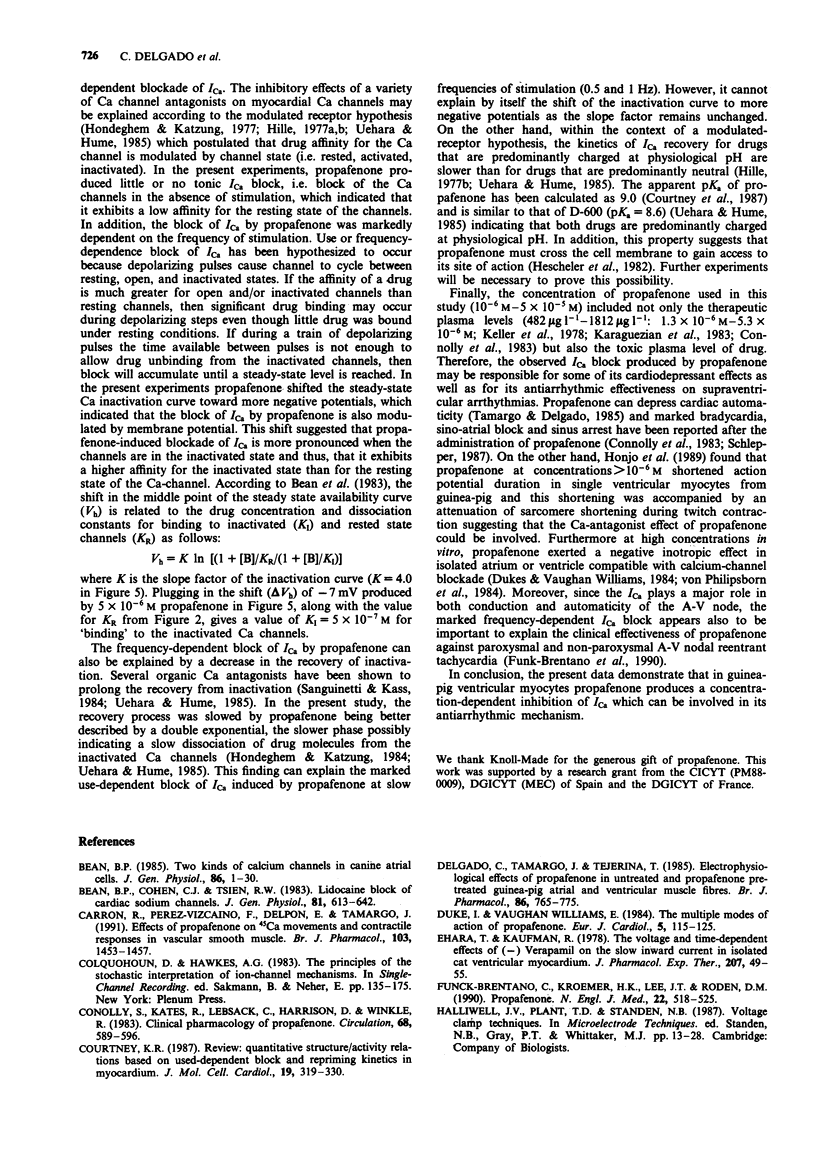
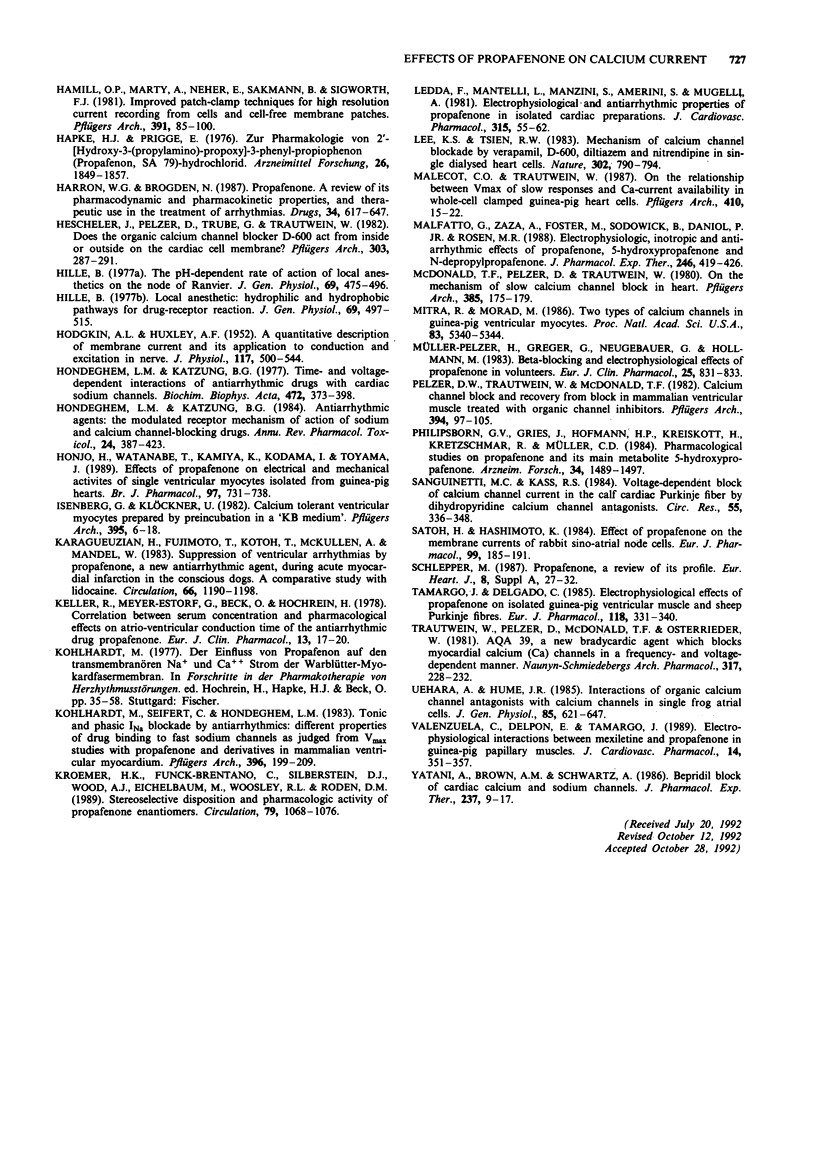
Selected References
These references are in PubMed. This may not be the complete list of references from this article.
- Bean B. P., Cohen C. J., Tsien R. W. Lidocaine block of cardiac sodium channels. J Gen Physiol. 1983 May;81(5):613–642. doi: 10.1085/jgp.81.5.613. [DOI] [PMC free article] [PubMed] [Google Scholar]
- Bean B. P. Two kinds of calcium channels in canine atrial cells. Differences in kinetics, selectivity, and pharmacology. J Gen Physiol. 1985 Jul;86(1):1–30. doi: 10.1085/jgp.86.1.1. [DOI] [PMC free article] [PubMed] [Google Scholar]
- Carrón R., Pérez-Vizcaino F., Delpón E., Tamargo J. Effects of propafenone on 45Ca movements and contractile responses in vascular smooth muscle. Br J Pharmacol. 1991 Jun;103(2):1453–1457. doi: 10.1111/j.1476-5381.1991.tb09810.x. [DOI] [PMC free article] [PubMed] [Google Scholar]
- Connolly S. J., Kates R. E., Lebsack C. S., Harrison D. C., Winkle R. A. Clinical pharmacology of propafenone. Circulation. 1983 Sep;68(3):589–596. doi: 10.1161/01.cir.68.3.589. [DOI] [PubMed] [Google Scholar]
- Courtney K. R. Quantitative structure/activity relations based on use-dependent block and repriming kinetics in myocardium. J Mol Cell Cardiol. 1987 Mar;19(3):319–330. doi: 10.1016/s0022-2828(87)80599-0. [DOI] [PubMed] [Google Scholar]
- Delgado C., Tamargo J., Tejerina T. Electrophysiological effects of propafenone in untreated and propafenone-pretreated guinea-pig atrial and ventricular muscle fibres. Br J Pharmacol. 1985 Dec;86(4):765–775. doi: 10.1111/j.1476-5381.1985.tb11098.x. [DOI] [PMC free article] [PubMed] [Google Scholar]
- Dukes I. D., Vaughan Williams E. M. The multiple modes of action of propafenone. Eur Heart J. 1984 Feb;5(2):115–125. doi: 10.1093/oxfordjournals.eurheartj.a061621. [DOI] [PubMed] [Google Scholar]
- Ehara T., Daufmann R. The voltage- and time-dependent effects of (-)-verapamil on the slow inward current in isolated cat ventricular myocardium. J Pharmacol Exp Ther. 1978 Oct;207(1):49–55. [PubMed] [Google Scholar]
- Funck-Brentano C., Kroemer H. K., Lee J. T., Roden D. M. Propafenone. N Engl J Med. 1990 Feb 22;322(8):518–525. doi: 10.1056/NEJM199002223220806. [DOI] [PubMed] [Google Scholar]
- HODGKIN A. L., HUXLEY A. F. A quantitative description of membrane current and its application to conduction and excitation in nerve. J Physiol. 1952 Aug;117(4):500–544. doi: 10.1113/jphysiol.1952.sp004764. [DOI] [PMC free article] [PubMed] [Google Scholar]
- Hamill O. P., Marty A., Neher E., Sakmann B., Sigworth F. J. Improved patch-clamp techniques for high-resolution current recording from cells and cell-free membrane patches. Pflugers Arch. 1981 Aug;391(2):85–100. doi: 10.1007/BF00656997. [DOI] [PubMed] [Google Scholar]
- Hapke H. J., Prigge E. Zur Pharmakologie von 2'-[2-Hydroxy-3-(propylamino)-propoxy]-3-phenylpropiophenon (Propafenon, SA 79)-hydrochlorid. Arzneimittelforschung. 1976;26(10):1849–1857. [PubMed] [Google Scholar]
- Harron D. W., Brogden R. N. Propafenone. A review of its pharmacodynamic and pharmacokinetic properties, and therapeutic use in the treatment of arrhythmias. Drugs. 1987 Dec;34(6):617–647. doi: 10.2165/00003495-198734060-00001. [DOI] [PubMed] [Google Scholar]
- Hescheler J., Pelzer D., Trube G., Trautwein W. Does the organic calcium channel blocker D600 act from inside or outside on the cardiac cell membrane? Pflugers Arch. 1982 Jun;393(4):287–291. doi: 10.1007/BF00581411. [DOI] [PubMed] [Google Scholar]
- Hille B. Local anesthetics: hydrophilic and hydrophobic pathways for the drug-receptor reaction. J Gen Physiol. 1977 Apr;69(4):497–515. doi: 10.1085/jgp.69.4.497. [DOI] [PMC free article] [PubMed] [Google Scholar]
- Hille B. The pH-dependent rate of action of local anesthetics on the node of Ranvier. J Gen Physiol. 1977 Apr;69(4):475–496. doi: 10.1085/jgp.69.4.475. [DOI] [PMC free article] [PubMed] [Google Scholar]
- Hondeghem L. M., Katzung B. G. Antiarrhythmic agents: the modulated receptor mechanism of action of sodium and calcium channel-blocking drugs. Annu Rev Pharmacol Toxicol. 1984;24:387–423. doi: 10.1146/annurev.pa.24.040184.002131. [DOI] [PubMed] [Google Scholar]
- Hondeghem L. M., Katzung B. G. Time- and voltage-dependent interactions of antiarrhythmic drugs with cardiac sodium channels. Biochim Biophys Acta. 1977 Nov 14;472(3-4):373–398. doi: 10.1016/0304-4157(77)90003-x. [DOI] [PubMed] [Google Scholar]
- Honjo H., Watanabe T., Kamiya K., Kodama I., Toyama J. Effects of propafenone on electrical and mechanical activities of single ventricular myocytes isolated from guinea-pig hearts. Br J Pharmacol. 1989 Jul;97(3):731–738. doi: 10.1111/j.1476-5381.1989.tb12010.x. [DOI] [PMC free article] [PubMed] [Google Scholar]
- Isenberg G., Klockner U. Calcium tolerant ventricular myocytes prepared by preincubation in a "KB medium". Pflugers Arch. 1982 Oct;395(1):6–18. doi: 10.1007/BF00584963. [DOI] [PubMed] [Google Scholar]
- Karagueuzian H. S., Fujimoto T., Katoh T., Peter T., McCullen A., Mandel W. J. Suppression of ventricular arrhythmias by propafenone, a new antiarrhythmic agent, during acute myocardial infarction in the conscious dog. A comparative study with lidocaine. Circulation. 1982 Dec;66(6):1190–1198. doi: 10.1161/01.cir.66.6.1190. [DOI] [PubMed] [Google Scholar]
- Keller K., Meyer-Estorf G., Beck O. A., Hochrein H. Correlation between serum concentration and pharmacological effect on atrioventricular conduction time of the antiarrhythmic drug propafenone. Eur J Clin Pharmacol. 1978 Mar 17;13(1):17–20. doi: 10.1007/BF00606676. [DOI] [PubMed] [Google Scholar]
- Kohlhardt M., Seifert C., Hondeghem L. M. Tonic and phasic INa blockade by antiarrhythmics. Different properties of drug binding to fast sodium channels as judged from Vmax studies with propafenone and derivatives in mammalian ventricular myocardium. Pflugers Arch. 1983 Mar 1;396(3):199–209. doi: 10.1007/BF00587856. [DOI] [PubMed] [Google Scholar]
- Kroemer H. K., Funck-Brentano C., Silberstein D. J., Wood A. J., Eichelbaum M., Woosley R. L., Roden D. M. Stereoselective disposition and pharmacologic activity of propafenone enantiomers. Circulation. 1989 May;79(5):1068–1076. doi: 10.1161/01.cir.79.5.1068. [DOI] [PubMed] [Google Scholar]
- Lee K. S., Tsien R. W. Mechanism of calcium channel blockade by verapamil, D600, diltiazem and nitrendipine in single dialysed heart cells. Nature. 1983 Apr 28;302(5911):790–794. doi: 10.1038/302790a0. [DOI] [PubMed] [Google Scholar]
- Malfatto G., Zaza A., Forster M., Sodowick B., Danilo P., Jr, Rosen M. R. Electrophysiologic, inotropic and antiarrhythmic effects of propafenone, 5-hydroxypropafenone and N-depropylpropafenone. J Pharmacol Exp Ther. 1988 Aug;246(2):419–426. [PubMed] [Google Scholar]
- Malécot C. O., Trautwein W. On the relationship between V max of slow responses and Ca-current availability in whole-cell clamped guinea pig heart cells. Pflugers Arch. 1987 Sep;410(1-2):15–22. doi: 10.1007/BF00581890. [DOI] [PubMed] [Google Scholar]
- McDonald T. F., Pelzer D., Trautwein W. On the mechanism of slow calcium channel block in heart. Pflugers Arch. 1980 May;385(2):175–179. doi: 10.1007/BF00588699. [DOI] [PubMed] [Google Scholar]
- Mitra R., Morad M. Two types of calcium channels in guinea pig ventricular myocytes. Proc Natl Acad Sci U S A. 1986 Jul;83(14):5340–5344. doi: 10.1073/pnas.83.14.5340. [DOI] [PMC free article] [PubMed] [Google Scholar]
- Pelzer D., Trautwein W., McDonald T. F. Calcium channel block and recovery from block in mammalian ventricular muscle treated with organic channel inhibitors. Pflugers Arch. 1982 Aug;394(2):97–105. doi: 10.1007/BF00582909. [DOI] [PubMed] [Google Scholar]
- Sanguinetti M. C., Kass R. S. Voltage-dependent block of calcium channel current in the calf cardiac Purkinje fiber by dihydropyridine calcium channel antagonists. Circ Res. 1984 Sep;55(3):336–348. doi: 10.1161/01.res.55.3.336. [DOI] [PubMed] [Google Scholar]
- Satoh H., Hashimoto K. Effect of propafenone on the membrane currents of rabbit sino-atrial node cells. Eur J Pharmacol. 1984 Mar 23;99(2-3):185–191. doi: 10.1016/0014-2999(84)90240-1. [DOI] [PubMed] [Google Scholar]
- Schlepper M. Propafenone, a review of its profile. Eur Heart J. 1987 Mar;8 (Suppl A):27–32. doi: 10.1093/eurheartj/8.suppl_a.27. [DOI] [PubMed] [Google Scholar]
- Tamargo J., Delgado C. Electrophysiological effects of propafenone on isolated guinea-pig ventricular muscle and sheep Purkinje fibres. Eur J Pharmacol. 1985 Dec 3;118(3):331–340. doi: 10.1016/0014-2999(85)90144-x. [DOI] [PubMed] [Google Scholar]
- Trautwein W., Pelzer D., McDonald T. F., Osterrieder W. AQA 39*, a new bradycardic agent which blocks myocardial calcium (Ca) channels in a frequency- and voltage-dependent manner. Naunyn Schmiedebergs Arch Pharmacol. 1981 Nov;317(3):228–232. doi: 10.1007/BF00503822. [DOI] [PubMed] [Google Scholar]
- Uehara A., Hume J. R. Interactions of organic calcium channel antagonists with calcium channels in single frog atrial cells. J Gen Physiol. 1985 May;85(5):621–647. doi: 10.1085/jgp.85.5.621. [DOI] [PMC free article] [PubMed] [Google Scholar]
- Valenzuela C., Delpón E., Tamargo J. Electrophysiologic interactions between mexiletine and propafenone in guinea pig papillary muscles. J Cardiovasc Pharmacol. 1989 Sep;14(3):351–357. doi: 10.1097/00005344-198909000-00001. [DOI] [PubMed] [Google Scholar]
- Yatani A., Brown A. M., Schwartz A. Bepridil block of cardiac calcium and sodium channels. J Pharmacol Exp Ther. 1986 Apr;237(1):9–17. [PubMed] [Google Scholar]
- von Philipsborn G., Gries J., Hofmann H. P., Kreiskott H., Kretzschmar R., Müller C. D., Raschack M., Teschendorf H. J. Pharmacological studies on propafenone and its main metabolite 5-hydroxypropafenone. Arzneimittelforschung. 1984;34(11):1489–1497. [PubMed] [Google Scholar]


